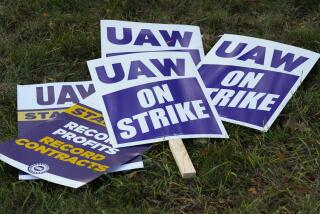Chrysler’s 3rd-Quarter Loss Hits $214 Million : Auto maker: The red ink comes while it faces the expiration of its contract with the UAW at midnight.
HIGHLAND PARK, Mich. — Chrysler Corp. today reported that it lost $214 million in the third quarter, nearly offsetting the $251 million it earned in the first six months of 1990.
The loss, which amounts to 95 cents a share, was a little less than expected by Wall Street analysts, and stemmed mainly from incentive costs and lower production caused when minivan plants were retooled.
The report came as Chrysler faced the midnight expiration of a contract it negotiated with the United Auto Workers in 1988.
During the third quarter of 1989, Chrysler earned $331 million, or $1.42 a share. The 1989 results were raised by a credit of $309 million from the sale of a stake in Mitsubishi Motors Corp. of Japan.
Chrysler said the third-quarter 1990 loss came on revenues of $6.5 billion, down 14.5% from $7.6 billion during the July-September period last year.
The company’s third-quarter losses were softened by $83 million in earnings for Chrysler Financial Corp. That profit, a record for any third quarter in Chrysler’s history, compares to third-quarter earnings last year of $76 million.
For the first nine months of the year, Chrysler earned $37 million, or 17 cents a share, compared with $983 million, or $4.21 a share, during the same time last year. Revenue fell 15.4% to $23 billion from $27.2 billion.
“We anticipated 1990 would be a tough year for Chrysler and for the industry, so we launched a major cost-cutting program over a year ago,” Chairman Lee A. Iacocca said today. “We didn’t anticipate the (Persian) Gulf crisis, the federal budget fiasco or the continued escalation in the incentive wars, so we’ve increased our cost-reduction goals to $2.5 billion over two years.”
Chrysler took its minivan plants in St. Louis and in Windsor, Canada, out of service for a month to retool for 1991 models, damaging profits by reducing wholesale sales to dealers. Minivans and, to a lesser extent, Jeeps are the bases for Chrysler’s profits.
The company is also being hit by high incentive costs. The Big Three would like to end the cash rebates and low-interest financing, but each is waiting for another to take the first step.
More to Read
Inside the business of entertainment
The Wide Shot brings you news, analysis and insights on everything from streaming wars to production — and what it all means for the future.
You may occasionally receive promotional content from the Los Angeles Times.










